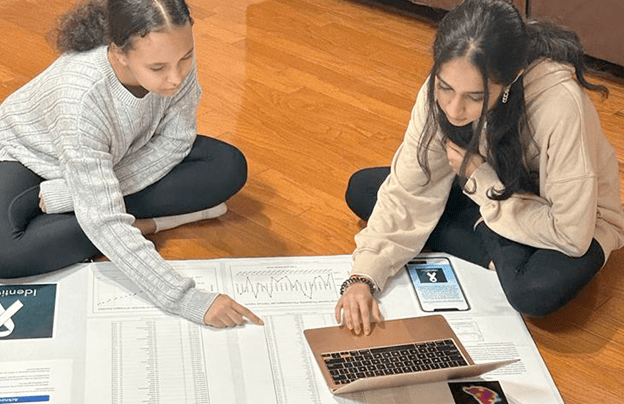Pictured: Lanier Middle School student, Nyambura Sallinen (left) and North Gwinnett Middle School student, Keshvee Sekhda (right) combine medical science and technology to advance improvements in cancer diagnosis . (Source: Society For Science)
North Gwinnett Middle School student, Keshvee Sekhda, and Lanier Middle School student, Nyambura Sallinen, have created an app they call IdentiCan.
The app is expected to recognize various cancers such as breast, lung and skin cancer with a 94.3% accuracy rate.
According to Society For Science, the duo programmed a machine to identify cancers from 8,000 photos and images of health scans for each type.
Discerning lung cancer involves the additional use of audio clips from lung cancer patients and contrasting them with clips of individuals with different respiratory diseases to better isolate diagnostically significant patterns
Their system asks the user to input additional information such as family medical history, which is relevant for a more accurate diagnosis.
The app user will upload their personal medical information, including both images and sound, and it will then produce a result that estimates the probability of a cancer diagnosis.
While they are not yet able to test their app on humans due to legal issues, continued progress is definitely on their future agenda. They will seek to collect more assessments from healthcare professionals and care settings such as hospitals, in the meantime.
“Cancer is a huge problem in our world that has touched millions of lives,” Nyambura said when speaking to Society For Science. She explained that family and friends affected by cancer had inspired her work.
Keshvee and Nyambura, both already embodying an especially keen interest in science, began exploring applications with artificial intelligence. They quickly realized the potential it had, in tandem with the crucial need for their cancer-detecting app.
“We automatically knew that we wanted to combat this problem by using these modern advancements,” Nyambura said.
Keshvee has experienced cancer diagnoses within her community, including a serious misdiagnosis. After the misdiagnosed man’s symptoms persisted, he returned to the hospital and received a heartbreaking diagnosis of an aggressive brain tumor.
“This man was only given a few months to live due to the mistake in interpreting earlier scans. My partner and I decided that we must do something to help people scan themselves and get the attention they need,” Keshvee noted in her statement to Society For Science.




